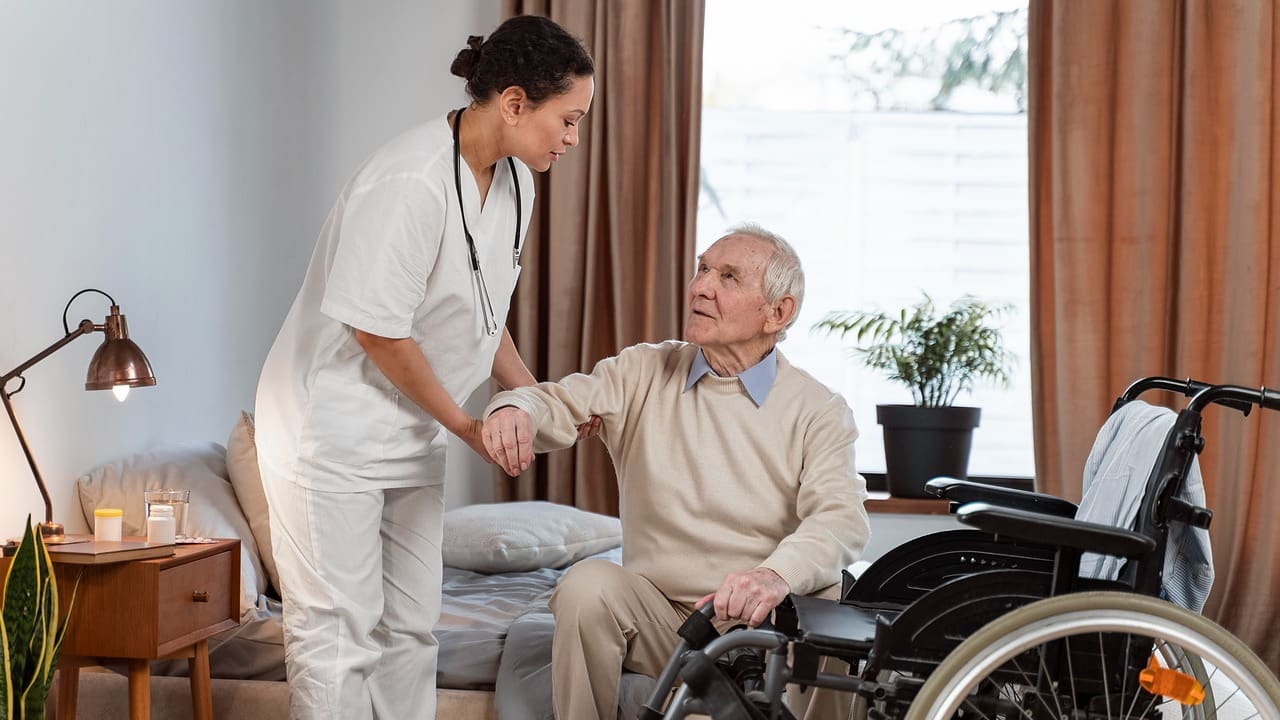What Is Home Care Services? Patient Guide to Eligibility, Coverage, and Costs
Home care services bring supportive help directly to your home so you can stay safe, independent, and comfortable. Many patients and families search “what is home care services” or “what are home care services” when they notice new challenges with daily activities or after a hospital stay.
Home care generally refers to non medical assistance such as bathing, dressing, grooming, toileting, mobility support, meal preparation, light housekeeping, companionship, medication reminders, and transportation to appointments. It aims to maintain quality of life and prevent avoidable emergency visits by supporting
routine needs.
Home health care services are different. They are skilled, clinical services provided at home by licensed professionals. These include skilled nursing (for wound care, injections, complex medication management), physical therapy, occupational therapy, speech language pathology, and medical social services. A short term home health aide may be included during an active skilled episode to support personal care.
Our clinic coordinates both options. If you need non medical support, we connect you with trusted home care agencies. If you need skilled medical services, we arrange home health care through licensed providers and align the plan with your physician’s orders. Many patients benefit from a blend of short term home health for recovery and non medical home care hours to ease daily routines.

Who Qualifies for Home Health Care Services (Medicare and Medicaid Explained)
A need for intermittent skilled services: Examples include wound care, IV or injection administration that requires a nurse, complex medication management, or rehabilitative therapy (PT/OT/SLP) after surgery, illness, or injury.
A physician (or qualified practitioner) must order and periodically review a plan of care.
You are considered homebound under Medicare rules: Leaving home requires considerable effort and assistance, and outings are infrequent and short (for medical care, religious services, or brief essential activities).
For non medical home care, eligibility varies:
- Private pay: Anyone can hire home care services directly.
- Long term care insurance often requires assistance with a certain number of activities of daily living
(ADLs) or cognitive impairment. - Medicaid: Many states offer Home and Community Based Services (HCBS) or waiver programs that
cover personal care if you meet financial and functional criteria. The number of covered hours and
waitlists varies by state. - Veterans: Some VA programs provide in home support for eligible veterans.
Does Medicare Cover Home Health Care Services? What’s Included and What Isn’t
Intermittent skilled nursing care.
- Physical therapy, occupational therapy, and speech language pathology.
- Medical social services.
- Part-time home health aide services are only available while you are also receiving covered skilled
care. - Certain durable medical equipment (DME) may be covered under Part B, often with coinsurance.
What Medicare generally does not cover:
- Long term, 24/7 in home care.
- Stand alone personal care or homemaker services when there is no current skilled need.
- Ongoing custodial care when skilled services are no longer medically necessary.
Patients also search “what home care services are covered by Medicare” and “does Medicare pay for in home care services.” The key is that Medicare focuses on skilled, intermittent services to help you recover or manage a condition safely at home.
Non medical personal care is not typically covered unless it is part of a short term skilled episode, and even then, hours are limited. We verify your benefits, coordinate physician orders, and connect you to a Medicare certified home health agency when appropriate.
Home Care vs. Home Health Care: What’s the Difference and Which Do You Need?
Understanding the distinction helps you plan and budget.
- Home care (non medical): Personal care (bathing, dressing), companion care (supervision, social engagement), and household help (light housekeeping, meal prep, errands). This is ideal when safety and daily routines are the main concerns. Payment is usually private pay, long term care insurance, some Medicaid programs, or VA benefits.
- Home health care (skilled medical): Skilled nursing and therapies provided at home based on a physician ordered plan of care. This is ideal after hospitalization, surgery, or a new diagnosis requiring clinical management. Payment may come from Medicare, Medicaid, or commercial insurance when the criteria are met.
If you’re unsure which you need, start with an assessment. Our clinic can screen for skilled needs (wounds, medication changes, rehab) and ADL support needs, recommending a blended plan if helpful.
What Services Does Home Health Care Provide? Nursing, Therapy, and Aides
- Skilled nursing: Comprehensive assessments; care planning with your physician; wound and ostomy
care; catheter and tube care; injections and IV medications; complex medication setup and education; disease specific teaching for heart failure, COPD, and diabetes; monitoring for infection or dehydration; and safe transition coaching after a hospital discharge. - Physical therapy (PT): Strengthening, balance training, gait training, transfer techniques, endurance building, home exercise programming, and fall prevention strategies.
- Occupational therapy (OT): Activities of daily living (ADL) training, energy conservation, upper extremity function, adaptive equipment recommendations, and home safety modifications.
- Speech language pathology (SLP): Swallowing therapy to reduce aspiration risk, speech/voice/cognitive communication rehab after stroke or neurological conditions.
- Medical social work: Community resources, caregiver support, counseling, advanced care planning, and coordination with community services.
- Home health aide (during a skilled episode): Personal care support such as bathing, grooming, and toileting coordinated with the nursing/therapy plan.
Our clinic aligns these services to your goals, such as safer mobility at home, fewer hospital readmissions, and clear medication routines.

How Much Do Home Care Services Cost and Who Pays?
Non medical home care: Typically billed hourly with minimum shift lengths. Rates may be higher for overnight, weekend, or holiday coverage, or for specialized dementia or advanced personal care.
Home health care: Usually billed per visit or episode under insurance guidelines when medically necessary.
Who pays:
- Private pay: Common for non medical personal care and companion services.
- Long term care insurance: May reimburse daily or weekly amounts when ADL/cognitive criteria are met. Pre authorization and licensed agency requirements often apply.
- Medicare: Covers home health care when criteria are met; does not cover long term custodial care.
- Medicaid: Many states cover personal care and community based support through HCBS or waiver
programs; eligibility and covered hours vary. - Veterans benefits: Certain programs may fund in home services for eligible veterans.
- Commercial insurance: Often covers post acute home health services with prior authorization.
Our financial counselors provide transparent estimates, verify benefits, and help you combine programs to minimize out of pocket costs.
Does Medicaid Cover Home Care Services? State Programs and Waivers
- Personal care attendant services (help with ADLs).
- Homemaker and chore services.
- Respite care for family caregivers.
- Adult day health services.
In some cases, home modifications or assistive technologies. Eligibility depends on state specific income/resource thresholds and functional need. Some programs have waitlists. Our clinic assists with screening, application paperwork, and connecting you to approved agencies.

When you or a loved one needs care at home—whether after a hospital stay, due to a chronic condition or simply for added comfort—you deserve a clear explanation of how the service works, what professionals will visit, and how your plan supports recovery and independence.
How to Apply for Home Care Services (Step by Step)
Step 1: Call our clinic to discuss symptoms, safety concerns, and goals. We’ll determine whether you need home health (skilled care), home care (non medical), or both.
Step 2: Physician orders. If skilled care is needed, we coordinate with your physician to create and sign a plan of care and gather clinical notes, medication lists, and discharge summaries.
Step 3: Benefits and authorizations. We verify Medicare, Medicaid, long term care insurance, VA, and commercial coverage and obtain any needed authorizations.
Step 4: Choose a provider. We recommend licensed, well reviewed agencies that match your language, schedule, and condition. You make the final selection.
Step 5: Home safety check. We identify fall risks and simple modifications (grab bars, shower chairs, lighting, and removing rugs).
Step 6: Start of care visit. A nurse or therapist assesses needs, confirms goals, and sets your visit schedule.
Step 7: Reassess and adjust. As you improve or your needs change, we will revise the plan and coordinate any additional home care hours.
How to Get Home Health Care Services for Elderly Loved Ones
Begin with a needs list:
- ADLs: Bathing, dressing, toileting, eating, mobility, transfers.
- IADLs: Meals, laundry, housekeeping, shopping, transportation, finances.
- Clinical needs: Wound care, medication setup, injections, and rehab therapies. Then: Request a home health referral from your clinician if skilled needs exist. For non medical support, ask for a home care assessment many agencies offer this at no cost.
- Verify benefits across Medicare, Medicaid, long term care insurance, commercial plans, and VA
programs. - Combine services as needed: short term skilled home health plus ongoing non medical home care.
- Revisit needs monthly; adjust hours and services to match safety, goals, and budget.
We also provide caregiver education, fall prevention strategies, and dementia friendly routine guides to support families.
What Home Care Services Are Covered by Medicare?

Covered when criteria are met: Intermittent skilled nursing; PT/OT/SLP; medical social services; and limited home health aide support during a skilled episode.
Not covered: Long term stand alone personal care, housekeeping, and continuous custodial care without a skilled need. If you’re unsure about eligibility, our team reviews your medical history, checks homebound status, and coordinates with a Medicare certified home health agency when appropriate.
Safety, Quality, and What to Expect at Your First Visit
- A comprehensive assessment of your health, medications, home layout, and safety risks.
- Personalized goals set with you and your family (for example, safer bathroom transfers, managing new medications, or building endurance).
- A clear visit schedule, education on warning signs, and phone numbers for urgent questions.
- Regular communication between your home care or home health team, our clinic, and your primary care clinician to keep your plan coordinated and up to date.
For more information about our academic and training initiatives, visit Liv Hospital Academy.
Frequently Asked Questions for Home Care Services
What tube services are included in Medicare home health?
Typically covered skilled nursing tasks such as catheter care, certain tube care, and medication administration when medically necessary and ordered.
Are home care services tax deductible?
Some out of pocket medical expenses may be deductible if IRS criteria are met and you itemize. Consult a tax professional.
What is the difference between home care and home health care?
Home care is non medical personal and household support; home health care is skilled, clinician led care at home.
How to get home health care services?
Request a referral from your clinician for skilled needs; we coordinate orders, verify benefits, and connect you with a Medicare certified agency.
How to apply for home care services?
Call our clinic, determine the right service type, coordinate physician orders (if skilled), verify benefits, select a provider, complete a home safety check, and start care.
Does Medicaid cover home care services?
Many states cover personal care and community based services through HCBS or waiver programs. Eligibility and covered hours vary by state.
Who pays for home health care services?
Medicare, Medicaid, commercial insurance, VA programs, and sometimes private pay, depending on eligibility and medical necessity, are available options.

